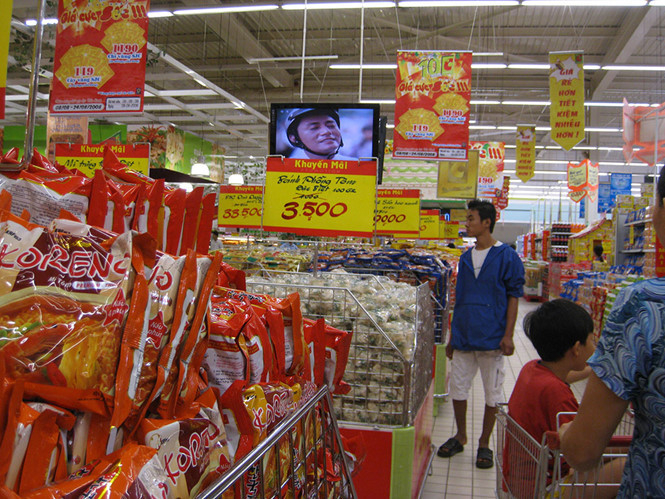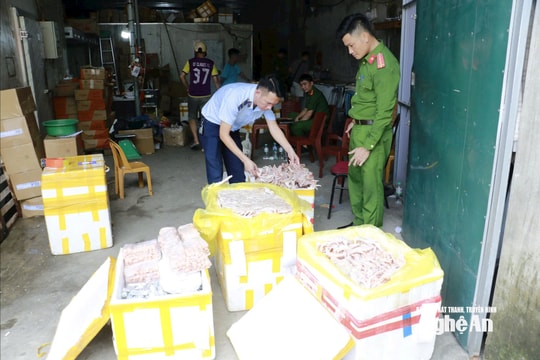New regulations help food businesses 'escape' dozens of licenses
Instead of being tied down by dozens of licenses, food manufacturers and traders have the right to self-declare and be responsible for their declarations.

New regulations have helped food businesses save costs and time.
That is one of the important contents stipulated in Decree 15/2018/ND-CP (Decree 15) which has just taken effect since the beginning of February this year. Accordingly, organizations and individuals producing and trading food must self-declare processed food... on mass media, enterprise websites, or publicly post at headquarters...
Sausages and ham "escaped" 15 - 17 licenses
According to Ms. Le Thi Thu - owner of a ham, sausage, and spring roll production facility in Bien Hoa City (Dong Nai), to have a certificate of food safety declaration as before, a set of documents must have complete documents: declaration of compliance with food safety regulations, detailed information about the product, certificate of free circulation or medical certificate, product testing results within 12 months from a designated testing room or an accredited testing room, periodic monitoring plan, product labels, product samples for comparison when submitting the application, scientific documents on ingredients, business registration certificate, certificate of food safety qualified facility, notarized copies of ISO certificates if any...
“At present, there are 11 documents, equivalent to 11 sub-licenses for each set of documents (copied into 2 copies) for the declaration. For 5 products of the facility, the declaration application is almost 2 hand spans thick. If this procedure is completely eliminated, it can be said that the enterprise will be freed from a heavy procedural debt like a rock,” Ms. Thu compared.
In addition, Mr. Le Quang Hau, owner of Quang Hau Nem Cha Food Processing Facility (Tan Phu District, Ho Chi Minh City), said that some localities also require inspection of banana leaves used to wrap sausages, training certificates for employees, water source testing, commitment of the facility owner on the origin of raw materials, periodic monitoring plan, quality control plan of the facility... Thus, it is estimated that for each set of documents to apply for food safety declaration for a sausage or ham, if fully complying with the mandatory principles of the management agencies, the facility owner must meet at least 15 - 17 types of documents. Depending on the locality, the service has a total cost including hard and soft fees of 6 - 10 million VND/set. The time for businesses to travel continuously is often nearly 2 months, or even longer.
Mr. Hau commented: “It is worth mentioning that the enterprise receives a certificate of confirmation for the announcement, but in that certificate it is stated that the enterprise must take full responsibility for the quality of the food it has announced. That means the food management agency issues a license to the enterprise but is completely not responsible for their confirmation. This is only management on paper and has no practical meaning but has “tortured” the enterprise for a very long time,” Mr. Hau said.
Save 10 million, 4 months for 1 product
A survey published by the Central Institute for Economic Management (CIEM) shows that to obtain a certificate of compliance with food safety regulations, businesses spend about 10 million VND for regular food and about 30 million VND for functional food, the average time to obtain certification is 4 months. Mr. Nguyen Xuan Ton, Executive Director of Long Trieu Coffee Production and Processing Facility (Lam Dong) commented that if the procedure for filing a declaration is completely eliminated, a coffee facility producing about 3 brands will save about 15 sub-licenses. Not to mention that during the production process, if any flavor is added to the product, it will continue to apply for a license...
Dr. Vu Tien Loc, Chairman of the Vietnam Chamber of Commerce and Industry, commented: “The sub-licenses of the health sector applied to enterprises in the food sector in the past were very formal, only taking samples for testing and could not cover everything. Enterprises doing illegal business took advantage of this granted license and considered it a “treasure”, and felt secure that they would not be punished for doing careless work. When the inspection team came, they just showed this “treasure” and considered it as doing it in accordance with the law.”
“Thousands of sub-licenses in the field of food safety management have contributed significantly to the damage of the state apparatus and the loss of consumer confidence in domestic enterprises,” said Mr. Loc.




